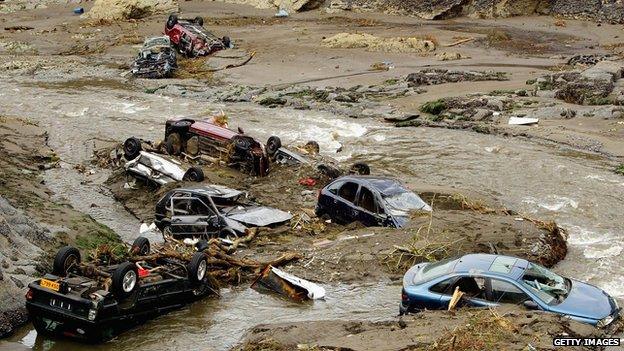Climate change to boost summer flash floods, says study
- Published

Flash flooding struck the north Cornwall village of Boscastle in the summer of 2004
Global warming will lead to a significant increase in extreme summer downpours in the UK, a study suggests.
The Met Office and Newcastle University researchers say there could be five times the number of "extreme rainfall events" exceeding 28mm per hour, under extreme warming projections.
This would cause "really severe" flash flooding in many parts of the UK, according to the scientists.
However, they caution that this result is based on only one computer model.
Flash flooding in Britain has had devastating impacts on communities in recent years.
In Boscastle, north Cornwall, about 200mm (8in) of rain fell in four hours in August 2004 causing a 3m wall of water to sweep through the village.
In the summer of 2012, in Newcastle, the equivalent of a month's rain fell in just two hours, causing widespread flooding in the city.
Super models
Researchers have struggled to work out how global warming might affect these types of events.
Until now, their climate models have not been good enough to work out the effect on extreme hourly rainfall in the warmer months.
To improve the resolution of their model, researchers in this latest experiment used 1.5km grid spacings instead of the normal 12km.
To gain this extra clarity, the Met Office supercomputer was employed for nine months to run the simulations. Even then, they could only model the southern half of the UK.
While the total amount of rainfall might decline, downpours are likely to increase
"Most people would be familiar with this model," Dr Lizzie Kendon, the report's lead author told 大象传媒 News.
"It is the same one that is used for the weather forecasts on the 大象传媒, so it is incredibly realistic and it represents these very intense convective-type storms that haven't been captured before."
The researchers used both the low resolution and the high resolution models to examine the climate patterns that have occurred in recent years and to look ahead to what might happen at the end of this century.
They assessed the period up to the year 2100 using the most high-end climate projections from the Intergovernmental Panel on Climate Change.
When they looked at rainfall patterns for the winter months, they found that both the 12km and 1.5km grid models showed an increase in rainfall.
Both models found that summers in the future would be drier overall.
However, when it came to intense downpours, defined as more than 28mm per hour, the higher resolution model saw a significant increase.
The study suggests that flash flooding events in the summer could become much more common in the UK
It found that there could be up to five times the number of events per hour than we see currently.
"It is dry periods interspersed with these very intense downpours, and we are talking about thresholds of 30mm and above in an hour over quite a large area here, which would be associated with really severe flash flooding," said Dr Kendon.
The researchers stress that this is the result of just one model run and it is not a definitive forecast.
Temperatures may not rise at the level used in the model.
However, the scientists believe that their work shows that global warming will make downpours a more frequent event in British summers.
"From this model experiment and consistent with our theoretical understanding, we have quite a bit of confidence in this result."
Prof Hayley Fowler, from Newcastle University, who is another author of the paper, said the new study was an important step to understanding the flooding risks of the future.
She hopes that other research groups will try to replicate the study.
"The next steps are to see if these changes are consistent with observed trends in summer rainfall extremes and changes projected by climate models in other parts of the world," she added.
The in the journal, Nature Climate Change.
Follow Matt on Twitter .
- Published30 May 2014
- Published18 February 2014